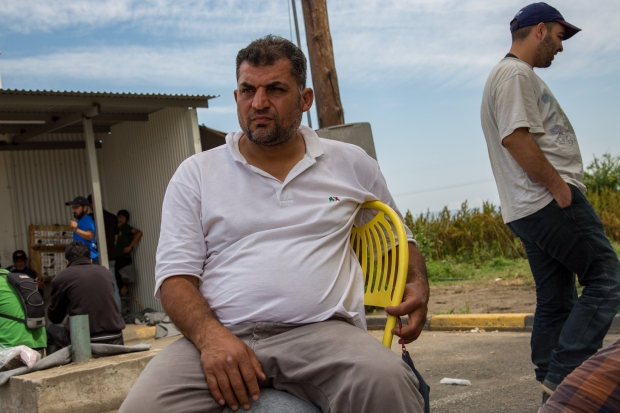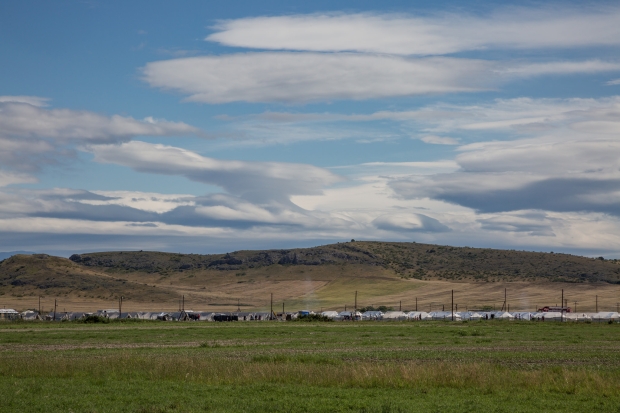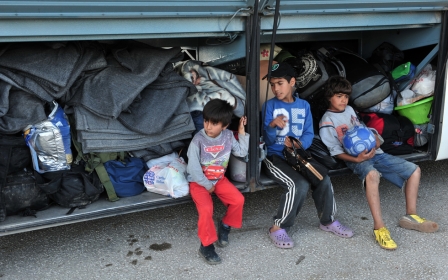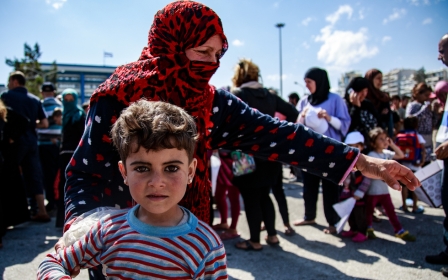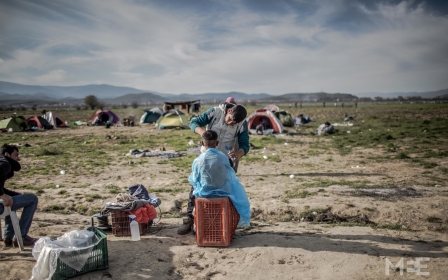Greece, where refugees prefer petrol station forecourts to military-run camps
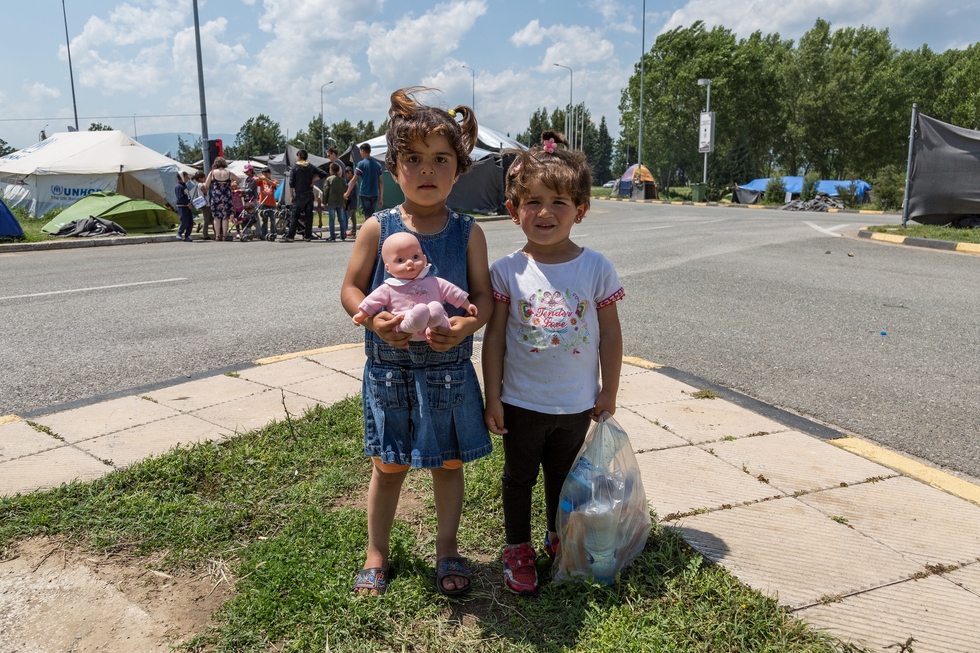
IDOMENI, Greece - A group of buses, escorted by police cars, leaves from the Idomeni refugee camp every 20 minutes. They carry those last hopeful refugees from Syria, Iraq and Afghanistan who, after three months of sleeping rough in anticipation, simply refused to believe that the borders would stay closed forever.
A few minutes later, as they zip down the motorway towards their new “specially designed processing facilities” just outside Greece’s second city of Thessaloniki, another group of refugees looks on with concern.
“People say that after the police have cleared Idomeni they will clear Hotel Hara,” said Abdullah Freij, a 22-year-old refugee from Daraa, Syria, referring to another camp nearby, “and then when Hotel Hara is empty the police will come here."
Abdullah is a resident of the EKO Gas Station camp, an informal refugee camp of 1,000 inhabitants, mostly Syrian and Iraqi refugees, which sprang up at a motorway petrol station 20km south of Idomeni.
Most have lived in the camp since the border was sealed in March. In that time, refugees have turned the petrol station forecourt into the closest thing they have to a permanent home, with a school, a playgroup, a kitchen, two clinics, a shop and even bakery.
But many of the camps residents fear that within a week they too will be put on buses and taken to military-run camps where they fear they will be isolated and forgotten.
Yasin Abu Rashed, a 14-year-old Syrian refugee from Damascus, leads a guided tour of the EKO camp which he now calls home.
“We have a kitchen where we make food every day, MSF [Doctors Without Borders] distribute food for breakfast, we have a school where the children can learn, because some haven’t been to school since three years, and we have a place for children to play games,” he told Middle East Eye.
Yasin now works in the refugee-run kitchen where he helps to chop vegetables, cook and clean. Despite their best efforts he explains that refugees still struggle to find enough food in the camp.
“We take a small meal for every person and it’s not enough,” he explains. “One cheese sandwich for everyone. For me one cheese sandwich is not enough. And we distribute soup in the kitchen, for one person it’s also not enough.”
Instead refugees make use of the a small shop run by Syrians to buy six markook flatbreads for a euro, which are prepared by a small bakery run by two Syrian bakers.
Yassin left Syria with his family four years ago to live in Egypt, but decided to try and reach Europe due to poor economic prospects. His family made it as far as Greece but they have been stuck at the EKO gas station since they arrived two months ago due to the border closure.
“Before [Greece] we were in Syria and then in Egypt, and the border was open and we thought it would be no problem to go to Europe. It was very dangerous to come here. And when we came here it was closed, and now we are very sad.”
Araz Mijed, a 26-year-old Iraqi Kurd, has been living in EKO for three months. He explains that despite difficulties he would rather stay there than move to a military one.
“[In Idomeni] they said back to Athens, back to military camp, why? Why do that?” he said. “Here is okay, EKO gas station is better. I love it here, I’ve been here three months… Arab and Syrian and Iraq and Afghanistan, we are brothers, we are safe here, but military camp I don’t like it.”
Military-run camps are inaccessible to independent volunteers and journalists can only enter with permission from the Greek government. Refugees fear that moving to military camps could leave them isolated and forgotten about.
'It was only meant to be a short trip'
Greek police began an operation to clear Idomeni early on Tuesday morning, after having brought in heavy police reinforcements on Monday from Thessaloniki and Athens.
About 50 squads of riot police are taking part in the operation which could last for over one week. A government source said the camp's 8,400 inhabitants would be transferred to “6,000 available places in reception centres".
Police began by restricting access to within 1km of the site to all volunteers and journalists. MEE gained access to the camp on Monday evening and spoke with refugees inside.
The majority of the camp’s inhabitants knew about the impending police operation but were confused and concerned about its purpose.
A group of young Syrian men, who did not wish to be identified, said at they had no intention of leaving Idomeni as it was the closest point to the frontier should it reopen.
Abdullah Freij was in Idomeni on Tuesday morning to witness the start of the operation. “About 1,000 police came yesterday morning,” he said.
“The police didn’t force anyone out but people freaked out when they saw all those police. What else could they do when there are so many? Nobody wants to leave because if we leave Idomeni, and everybody goes to camps with no press allowed inside we will be forgotten.”
Abdullah is two times a refugee, his family having already fled Palestine for Daraa in Syria before he was born. After the civil war broke out he left Daraa to escort his 65-year-old grandmother to stay with relatives in Germany.
“It was only meant to be a short trip,” he said, “but then the border closed and now we’ve been stuck here three months.”
“We refused to go inside because it was so bad”
A short walk through the fields from the EKO camp is Nea Kavala, a military-run camp on the site of a disused airstrip, which houses almost 4,000 refugees.
Refugees there complain that facilities are bad and food poor and say they often travel to the EKO camp, which they describe as better than their own, in order to buy food and trade supplies.
“It’s really bad here,” Abdulrahman Al Hayek, a 20-year-old refugee from Damascus, said.
“We live at the end of the camp and it’s just in a field a long way from other places. There is little water and it is bad, not good to drink, but we drink it because we have no choice. But two days ago they start to give us bottled water.
“There is no electricity. We must walk about 40 minutes to find electricity to charge our phones. We walk an hour to buy SIM cards so we can talk to our families.
“The food is disgusting and it is very little. We walk to EKO gas station to buy and trade food because they have more than us. EKO is better than Nea Kavala, definitely.”
Abdulrahman said that refugees were reluctant to leave Idomeni because they did not trust that conditions inside the military-run camps would be better than in informal ones.
“The police told us they will take us on buses to a camp in Thessaloniki which is very nice, but instead they took us to Katsika camp near Ioannina, which was terrible. People there had to sleep on the ground on a lot of stones. We slept on the buses and we refused to go inside because it was so bad. If we got off the bus, they would leave and we’d be stuck there.
“The police always lie to us, they lied to us from the first day.”
New MEE newsletter: Jerusalem Dispatch
Sign up to get the latest insights and analysis on Israel-Palestine, alongside Turkey Unpacked and other MEE newsletters
Middle East Eye delivers independent and unrivalled coverage and analysis of the Middle East, North Africa and beyond. To learn more about republishing this content and the associated fees, please fill out this form. More about MEE can be found here.


